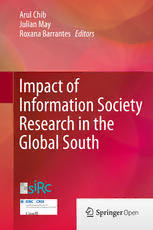
Impact of Information Society Research in the Global South PDF
Preview Impact of Information Society Research in the Global South
Arul Chib Julian May Roxana Barrantes Editors Impact of Information Society Research in the Global South Impact of Information Society Research in the Global South Arul Chib • Julian May (cid:129) Roxana Barrantes Editors Impact of Information Society Research in the Global South Editors ArulChib JulianMay WeeKimWeeSchoolforCommunication InstituteforSocialDevelopment andInformation UniversityoftheWesternCape NanyangTechnologicalUniversity Bellville,WesternCape Singapore SouthAfrica RoxanaBarrantes InstitutodeEstudiosPeruanos Lima,Peru This work was carried out with the aid of a grant from the International Development ResearchCentre,Ottawa,Canada.Theviewsexpressedhereindonotnecessarilyrepresent thoseofIDRCoritsBoardofGovernors. ISBN978-981-287-380-4 ISBN978-981-287-381-1 (eBook) DOI10.1007/978-981-287-381-1 LibraryofCongressControlNumber:2014958028 SpringerSingaporeHeidelbergNewYorkDordrechtLondon © TheEditor(s) (if applicable) and TheAuthor(s) 2015. Thebook is published with open access at SpringerLink.com. OpenAccessThisbookisdistributedunderthetermsoftheCreativeCommonsAttributionNoncom- mercialLicense,whichpermitsanynoncommercialuse,distribution,andreproductioninanymedium, providedtheoriginalauthor(s)andsourcearecredited. All commercial rights are reserved by the Publisher, whether the whole or part of the material is concerned,specificallytherightsoftranslation,reprinting,reuseofillustrations,recitation,broadcasting, reproductiononmicrofilmsorinanyotherphysicalway,andtransmissionorinformationstorageand retrieval,electronicadaptation,computersoftware,orbysimilarordissimilarmethodologynowknown orhereafterdeveloped. Theuseofgeneraldescriptivenames,registerednames,trademarks,servicemarks,etc.inthispublication doesnotimply,evenintheabsenceofaspecificstatement,thatsuchnamesareexemptfromtherelevant protectivelawsandregulationsandthereforefreeforgeneraluse. Thepublisher,theauthorsandtheeditorsaresafetoassumethattheadviceandinformationinthisbook arebelievedtobetrueandaccurateatthedateofpublication.Neitherthepublishernortheauthorsor theeditorsgiveawarranty,expressorimplied,withrespecttothematerialcontainedhereinorforany errorsoromissionsthatmayhavebeenmade. Printedonacid-freepaper SpringerScience+BusinessMediaSingaporePteLtd.ispartofSpringerScience+BusinessMedia(www. springer.com) Foreword The contributors to this volume make a crucial and forceful point. There are numerous theories and methodologies that can be used to yield research findings aboutthepotentialofinformationandcommunicationtechnologies(ICTs)tomake a positive difference in people’s lives. Whether the findings in any particular researchprojectactuallycontributein this way dependson multiple factors,some affectingresearchersthemselves,othersonwhetheractorsbeyonduniversity-based research communitiesare interested and have the resourcesthat are necessary for learning. It is not only researchers for whom capacity building is essential. It is essentialthatalltheactorswhohaveaninterestinwhetherdigitalICTsareproduced andusedinbeneficialwayshavethe capacityto learnabouthowtheycanmakea differenceinpeople’slives.Theneedtobuildcapacityforlearningfromarangeof typesofevidencedevelopedbybothresearchersandpractitionersappliesasmuch togovernmentactorsasitdoestothoseintheprivatesectorandrepresentativesof civilsociety.Thisvolumeillustratesthisextremelywell. TheSIRCAII(StrengtheningInformationSocietiesResearchCapacityAlliance) programme involved researchers in research capacity building focusing on ICTs in contemporary information societies in the African, Asian and Latin American regions. The first part of the volume is concerned with research on ‘impact’; the secondsetsouthowresearchintheglobalSouthiscontributingtoourunderstanding of the information societies in these regions. The results of this second SIRCA programme offer varied reflections on how learning has accumulated within this communityofresearchers.Intheopeningchapter,ArulChib(‘Researchonimpact of the information society in the Global South: An introduction to SIRCA’) says that ‘impact, even during the process of evaluation of the proposals [for SIRCA II], was difficult to define, describe, or agree upon, leading to contested debate’. There is a multiplicity of voices, methodologies and theoretical traditions in the interdisciplinary fields of research that investigate the role of ICTs ‘in’, ‘for’, andsometimes‘and’development.Thisvolumeincludesmanyillustrationsofthe richness of approaches within the social sciences. In this case, there is also an v vi Foreword emphasisoncriticallyevaluatingwhatdevelopmentmeansforthosewithaninterest in the social, economic,politicalor culturaloutcomesthatmaybe expectedwhen ICTsareinvolved. The coherenceof this volume (and of the research programme)lies not in any specific theory or method that is privileged but in the way research questions are posed and the rationale for undertakingthe researchprogrammein the first place. We find a strong commitment to several core principles. The first is that under- standingtheimpactofICTswithininformationsocietiesrequiresacommitmentto the analysis of developmentalchange in a way that extends beyondthe economic dynamicsofthemarketplace.Thesecondisacommitment,regardlessoftheoretical or methodologicalstance, to participatoryresearch and especially to participatory actionresearchthatinsistsonlocalstakeholdersbeingabletoengagewithchoices that are made in the process of implementing ICTs. Linked to this, is a third principle.Thisisensuringthatresearchisasmuchaboutdiscovery(i.e.thecauses ofthings)as itis aboutmakingchangeinthe worldin a waythatis inclusiveand consistentwithvaluesofjusticeandequity. Debates in universities about what should be understood as the ‘impact of research’areunlikelytoabate.Asiswellemphasizedinthisvolume,when‘impact’ is set as a criterion for judging the excellence of research, it inevitably creates incentives that shape both the topics that are researched and the way researchers undertaketheirwork.Becausethereissomuchcontroversyabouthowtomeasure the impact of academic research, measures of impact are in constant flux. This suggeststhatthehighestpriorityforresearchersthemselvesistoworkouthowtheir owncommitmentstoenablingpositivechangethroughresearchcanbeenhancedby exploitingopportunitieswithinthe‘impact’agendasofothers.Whentheylearnhow toproceedinthisway,theyhavethepotentialtomakeanevenbiggerdifferencethan they might otherwise have made. Building capacity within research communities forthestrategicexploitationofanalwaysshiftingimpactagendaiscrucial.Thisis especiallysoinregionsoftheworldwithrelativelyfewerresourcesfortheconduct ofresearchthanisthecaseintheUnitedKingdom,forexample. The second part of this volume displays a rich research evidence base. The SIRCAscholarsaddresstheimplicationsofthedevelopmentandimplementationof ICTs for povertyreduction,mobile financial and education services development, thereductionofcybercrime,strengtheningwomen’sentrepreneurship,andcreating new online spaces for public consultation and the expression of public opinion. The results illustrate the value of a collaborative effort that provides mentoring for researchers and supports their initiatives through dialogue with each other and,crucially,with interestedothers. Each of the chaptersin this partsucceedsin advancingbothconceptualandappliedknowledge. The question remains nevertheless:Does this work demonstrate ‘impact’? It is worthpausingtoreflectonwhatresearchersandvariousstakeholdercommunities meanbythisterm.Forsome,itmaymeanthatthereisademonstrablestrongeffect of the research on someone or something. For others, it may mean that it can be claimedthattheresearchhashadaninfluence,onethatmaybeperceivedasbeing positiveornegativedependingonwheretheassessorwhomakesthisjudgementis Foreword vii situated.Differentactorswillhavecontradictoryviewsaboutwhatcanbeclaimed as‘impact’evenincaseswhenthereisagreementaboutthevalueofparticipatory research.Thisisunavoidablebecausethereisoftenprofounddisagreementamong different communities of actors about what development means and, therefore, aboutwhatkindof changeresearchersinvestigatingthe impactof ICTsshouldbe encouraging. Even if impact assessment tools detect that change has happened and that ICTs are implicated in that change, it matters whether that change is consensual or achieved through external enforcement. We might imagine a world in which dialogue among all the stakeholders leads to a consensus about what would constitute positive change in information societies in the global South or, indeed, in all parts of the world. However, in reality, the process of achieving a dialogue abouthow ICTs can be introducedin a way thatis inclusive,just and equitableis a struggle becauseit involvescompetingnormativeframeworks.The resultis that ‘impact’–howeveritismeasured–willberegardedaspositive,negativeormixed bythosewithdifferentinterestsinthedevelopmentalprocessanditsoutcomes. Thecontributorstothisvolumeavoidthecommonpitfallofopposingcuriosity- drivenacademicresearchtosocialproblem-drivenresearch.Instead,theyacknowl- edge that learning thrives on both. When considering the ‘impact’ of research, it is helpfulto recall Latour’s (2013) point that inquiry and change require an open and negotiated sharing of new knowledge, however it is produced. Albagli and Maciel (2010) argue, similarly, that in considering how information societies are developingintheglobalSouth,itisimportanttounderstandthatthereisnosingle modelofchangethatappliesuniversally.DiverseICTapplicationsarelikelytobe welcomedwhenlocalactorsseetheirnormativecommitmentsbeingtranslatedinto arrangements for the design and implementation of these technologies in a way thattheyregardasjustandequitable.Aimingtoachieveparticipatoryinvolvement in ICTs ‘for’ development is as good a guide as any for fostering research that demonstrateshowICTsbecomeembeddedinsocietiesinwaysthatareempowering notforthefewbutforthemany.Thisvolumeisexemplaryinmakingexplicitthe needforresearchthatcanempowerthewidestpossiblenumberofstakeholders.The SIRCA IIprogrammehasbeena vitalstep alonga pathwaytowardsensuringthat thereisaproductivedialogueabouttheassumptionsthatunderpinresearchonthe roleofICTsintheprocessofbuildinginformationsocieties. TheLondonSchoolofEconomicsandPoliticalScience RobinMansell London,UK References Albagli,S.,&Maciel,M.L.(Eds.).(2010).Information,powerandpolitics:Technologicaland institutionalmediations.LexingtonBooks. Latour,B.(2013).Aninquiryintomodesofexistence.Cambridge:HarvardUniversityPress. Contents Researchonthe Impact ofthe InformationSocietyinthe GlobalSouth:AnIntroductiontoSIRCA..................................... 1 ArulChib PartI ImpactofResearch TheImpactofResearchonDevelopmentPolicyandPractice: ThisMuchWeKnow ............................................................ 21 RogerHarris ConstructingTheoriesofChangeforInformationSociety ImpactResearch ................................................................. 45 AlexanderFlor ANewSetofQuestions:ICT4DResearchandPolicy ....................... 63 AndreaOrdóñez ProgressTowardsResolvingtheMeasurementLinkBetween ICTandPovertyReduction..................................................... 83 JulianMayandKathleenDiga The Impact of mFinance Initiativesin the GlobalSouth: AReviewoftheLiterature...................................................... 105 ArulChib,LauraLeón,andFouziahRahim An Analytical Framework to Incorporate ICT as anIndependentVariable ........................................................ 125 MatíasDodel ix
